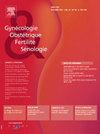Premières données françaises sur les demandes de don de spermatozoïdes faites par les couples de femmes
IF 0.6
4区 医学
Q4 OBSTETRICS & GYNECOLOGY
引用次数: 0
Abstract
Objective
The new bioethics law, enacted on August 2, 2021, has expanded access to medically assisted reproduction (MAR) with sperm donation to unmarried women and female couples. The implementation of this law led to a significant influx of sperm donation requests at French sperm banks. This major development in the field of ART in France, and in French society as a whole, prompted us to focus specifically on the requests from female couples.
Method
A retrospective, single-center study was conducted at a gamete donation center in Paris. The data of women in same-sex couples who attended a first consultation with a biologist between October 1, 2021, and October 31, 2022, were analyzed and compared to those of women in heterosexual couples who also requested MAR with sperm donation during the same period. The ART attempts and their outcomes were analyzed up until May 31, 2024.
Results
A total of 117 women in same-sex couples and 75 women in heterosexual couples were included in the study. The profiles in terms of age, ovarian reserve, and history of gynecological conditions did not differ between the two groups. The only observed differences were related to lifestyle, particularly alcohol consumption, which was slightly higher among women in same-sex couples. Additionally, women in same-sex couples appeared to belong more frequently to the category of intermediate professions, but no differences were observed concerning other occupational categories. Regarding the outcomes of ART attempts, cumulative rates of early and ongoing pregnancies were not different between the two groups.
Conclusion
This study thus provides an initial insight into the profile and outcomes for women in same-sex couples who received ART with sperm donation shortly after the enactment of the bioethics law in France. The similarity in profiles and ART outcomes between women in same-sex couples and those in heterosexual couples supports the approach of offering similar medical care, regardless of the couple's configuration.
[法国第一份关于女性夫妇捐精请求的数据]。
目的:2021 年 8 月 2 日颁布的新生物伦理法将捐精医学辅助生殖(MAR)的适用范围扩大到未婚女性和女性夫妇。该法的实施导致法国精子库收到大量捐精申请。法国以及整个法国社会在人工生殖领域的这一重大发展促使我们特别关注女性夫妇的捐精申请:方法:我们在巴黎的一家配子捐献中心进行了一项回顾性的单中心研究。我们分析了 2021 年 10 月 1 日至 2022 年 10 月 31 日期间接受生物学家首次咨询的同性伴侣中女性的数据,并将这些数据与同期提出 MAR 捐精请求的异性伴侣中女性的数据进行了比较。对截至 2024 年 5 月 31 日的 ART 尝试及其结果进行了分析:共有 117 名同性夫妇和 75 名异性夫妇中的女性参与了研究。两组妇女在年龄、卵巢储备功能和妇科病史方面没有差异。唯一观察到的差异与生活方式有关,尤其是饮酒量,同性伴侣中的女性饮酒量略高。此外,同性伴侣中的女性似乎更多属于中间职业类别,但在其他职业类别中没有观察到差异。关于 ART 尝试的结果,两组之间的早孕和持续妊娠累积率没有差异:因此,本研究对法国生物伦理法颁布后不久接受捐精抗逆转录病毒疗法的同性伴侣妇女的情况和结果进行了初步了解。同性伴侣妇女与异性伴侣妇女在概况和抗逆转录病毒疗法结果方面的相似性支持了提供类似医疗服务的方法,无论夫妻双方的结构如何。
本文章由计算机程序翻译,如有差异,请以英文原文为准。
求助全文
约1分钟内获得全文
求助全文
来源期刊

Gynecologie Obstetrique Fertilite & Senologie
Medicine-Obstetrics and Gynecology
CiteScore
1.70
自引率
0.00%
发文量
170
期刊介绍:
Gynécologie Obstétrique Fertilité & Sénologie est un mensuel scientifique d''information et de formation destiné aux gynécologues, aux obstétriciens, aux sénologues et aux biologistes de la reproduction. La revue, dans ses éditoriaux, articles originaux, mises au point, lettres à la rédaction et autres rubriques, donne une information actualisée ayant trait à l''obstétrique et à la gynécologie et aux différentes spécialités développées à partir de ces deux pôles : médecine de la reproduction, médecine maternelle et fœtale, périnatalité, endocrinologie, chirurgie gynécologique, cancérologie pelvienne, sénologie, sexualité, psychosomatique…
 求助内容:
求助内容: 应助结果提醒方式:
应助结果提醒方式:


